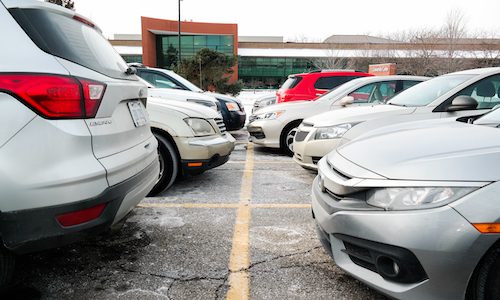
As you’ve probably heard, the University of Michigan has set a major goal to combat climate change: To have all three campuses go completely carbon neutral. While getting there will look a little different on each campus, we know that here at UM-Dearborn, a major part of the solution will be rethinking how we all get to campus. A large portion of our students, faculty and staff regularly commute long distances, adding heavily to the university’s total carbon footprint. So what can we do about it? On Wednesday, two members of the commuting analysis team, part of the President's Commission on Carbon Neutrality, came to campus to lead a town hall about potential solutions. Here are some of the big takeaways from the forum, in case you missed it.
Transportation is really a housing question
One thing the Commuting Analysis Team tackled straight away was mapping the distribution of UM-Dearborn students based on their home addresses; and the distribution of faculty and staff residences. The results were pretty revealing: Much of the UM-Dearborn community is commuting 20 or more miles to get to campus. Consequently, one of the more aggressive policy questions the carbon neutrality team is considering is whether we should actually encourage people to live closer to campus. A policy like that might include everything from building more campus housing to offering subsidies (like down payment assistance) for faculty or staff who choose to relocate. Many participants in the group discussion noted the latter could prove challenging — citing that they chose the communities they live in for a variety of reasons, including the quality of schools, affordability of housing, or proximity to a spouse’s work.
Is parking priced right?
Could making parking less convenient — mainly by making it less abundant and more expensive — push people into using their cars less? That’s another one of the aggressive solutions people discussed at Wednesday’s forum. For sure, it’s a controversial idea, and the team did acknowledge it’s one better suited for the Ann Arbor campus. But tiered prices for parking are commonly deployed in cities to reduce congestion. In London, a similar measure aimed at reducing carbon emissions even imposes a surcharge for diesel- and gasoline-powered vehicles entering the central part of the city. Notably, an essential part of making a solution like this work is having good alternatives for people to switch to: If you raise prices for parking, but don’t, for example, have a viable public transit system to entice people, then you’ve simply made parking more expensive. Similarly, reps from the team say it’s vital that new policies don’t create affordability issues for people with tight budgets.
Everyone can basically agree that we need better transit
Many participants in the discussion expressed an eagerness to switch to public transit. But it’s no secret our regional transit system has some major issues that keep many people from seeing it as a viable option. The group says pursuing new collaborations with existing transit authorities to provide new routes — especially partnering with Dearborn’s transit center to provide “last mile” solutions to campus — will likely be a major part of the solution. But matchmaking systems for people interested in carpooling, or expanding the use of university-run commuter vans for outer-ring commuters, could also chip away at emissions. One other piece of low-hanging fruit: Expanding the shuttle system between UM-Dearborn’s two campuses. When asked how they get from one campus to the other, most participants in the forum said they drive — simply because walking or taking the shuttle might be viewed as eating up too much work time in the eyes of their supervisors.
Telecommuting
More than any other topic, telecommuting inspired the liveliest discussion. And not just because many people enjoy the flexibility of working from home. From a carbon perspective, the idea of promoting more home-based work is hard to beat: It has huge, immediate impacts because it simply eliminates trips to campus and thus millions of commuter miles traveled. Plus, compared to other solutions, it’s cheap to implement. Still, many who like the idea expressed nervousness about whether supervisors would be accepting of workers who made use of the policy. One idea that could ease the culture change: Have one department or unit pilot a work-from-home policy to work out the kinks and document its impacts (both positive and negative), before implementing it universitywide. On the student side, the formula is a little more complicated. But it basically means expanding our lineup of online and hybrid classes, which there is growing momentum for already.
###
Have an idea you'd like to share? The President's Commission on Carbon Neutrality has a webpage where you can sound off about all things carbon neutral.





